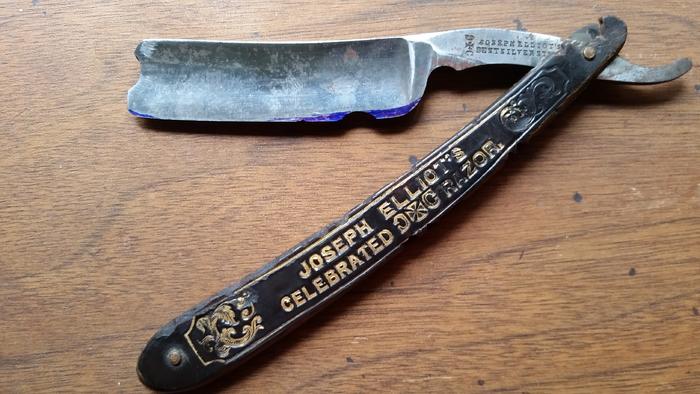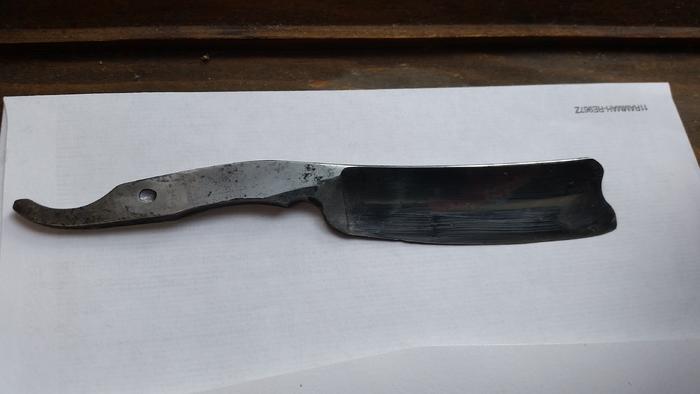Results 1 to 10 of 21
-
07-23-2017, 09:57 PM #1Senior Member

- Join Date
- Feb 2016
- Location
- Pittsburgh, PA
- Posts
- 171
Thanked: 17 Any wisdom on removing stabilizer?
Any wisdom on removing stabilizer?
After botching my $2 MJ Higgins restoration with a dremel and a flap wheel I decided to try to redeem myself with a $1 Elliot with a bad heel chip and bug eaten scales.
Ive been looking at the razor for a while, but thought it might be too damaged to repair. For the price though it was worth it to practice. Beyond the chip the blade I think is awesome.
Practiced depinning without damaging scales and that went well.
Reshaping went well on the grinder, but I need to get rid of the stabilizer. Probably just need to do it at the edge but I'd like to get a shoulderless appearance. Started with the dremel but after the last try I want to avoid power tools. Hard spot to get with a file, and I can't really come up with a good approach.
Does anyone have any advice they can share with me? I've attached before and after photos.


-
07-23-2017, 10:24 PM #2

I found this thread and info by Euclid440 to be very helpful for reshaping stabilizers
http://straightrazorpalace.com/honin...file-heel.html"Go easy"
-
The Following User Says Thank You to xiaotuzi For This Useful Post:
Geezer (07-24-2017)
-
07-23-2017, 10:27 PM #3Historically Inquisitive



- Join Date
- Aug 2011
- Location
- Upstate New York
- Posts
- 5,782
- Blog Entries
- 1
Thanked: 4249
Here a good tutorial on how to finish from there: http://straightrazorpalace.com/works...-me-smile.html
-
The Following User Says Thank You to Martin103 For This Useful Post:
Geezer (07-24-2017)
-
07-24-2017, 12:38 AM #4

These tutorials will have solid advice and instructions. If you take your time you will be just fine. Just as future reference grinders might not be the best tool, if the blade is over heated it will lose temper hence the part or a larger part of the blade won't take a proper edge.
Nothing is fool proof, to a sufficiently talented fool...
-
07-24-2017, 12:44 AM #5Senior Member




- Join Date
- Feb 2013
- Location
- Haida Gwaii, British Columbia, Canada
- Posts
- 14,458
Thanked: 4830
Those are great threads. One of the things that I typically do when reshaping is high angle honing. I am always super cautious though with doing that with chipped blades. Chips scan be harbouring cracks and high angle honing can make them run, especially on coarse hones. Be absolutely certain before doing high angle honing on blades with serious deep chips like that. It may require perpendicular bread knifing and then high angle to cut it back and then regular honing with tape.
Last edited by RezDog; 07-24-2017 at 01:59 PM.
It's not what you know, it's who you take fishing!
-
The Following User Says Thank You to RezDog For This Useful Post:
Clayglen (07-24-2017)
-
07-25-2017, 02:01 AM #6Senior Member

- Join Date
- Feb 2016
- Location
- Pittsburgh, PA
- Posts
- 171
Thanked: 17
Surely good info provided by all, but to be clearer I want to grind away the stabilizer and shoulder to go with a shoulderless look. Again it's a hard spot to manage with different levels, angles, facets, and the concave grind of the blade.
-
07-25-2017, 02:13 AM #7

Oh boy, I'm guessing that would take a skilled hand. Not saying you can't accomplish it please don't think that. But for that you would want a knife grinder I would think, different sizes wheels and such. Even then ruining the temper would concern me the most. Hopefully someone with better experience will be along.
Nothing is fool proof, to a sufficiently talented fool...
-
07-25-2017, 02:15 AM #8

That's a shame to not just leave it as is, it's a beautiful blade. How big is it?
Nothing is fool proof, to a sufficiently talented fool...
-
07-25-2017, 02:22 AM #9Senior Member

- Join Date
- Feb 2016
- Location
- Pittsburgh, PA
- Posts
- 171
Thanked: 17
I'll have to measure tomorrow, I'm guessing it was 13/16 before grinding away the chip, and maybe will be 5/8 after.
I suppose I could leave the shoulder and push the heel a little further away from the stabilizer, if the wisdom of the group thinks that's best. Was curious if anyone had done a shoulder-ectomy.
-
07-25-2017, 02:38 AM #10

I like that this blade has a neat, and somewhat rare, little dip underside of the tang right up near the blade.
I have a feeling this blade might be an old regrind, don't worry it's not a bad thing. Just meaning it was possibly a near wedge to begin then long ago it was ground again. Because of the look of the grind and how the shoulder cuts into the tang a tad high, a little into that diagonal line. Not 100% sure but that's the feeling I get. Regardless, the grinder left the shoulder for a reason, to give it strength and stability, hence "stabilizer".Last edited by xiaotuzi; 07-25-2017 at 02:41 AM.
"Go easy"


 34Likes
34Likes LinkBack URL
LinkBack URL About LinkBacks
About LinkBacks






 Reply With Quote
Reply With Quote